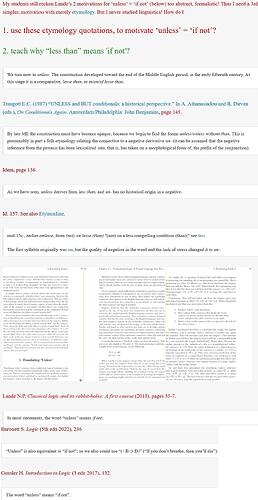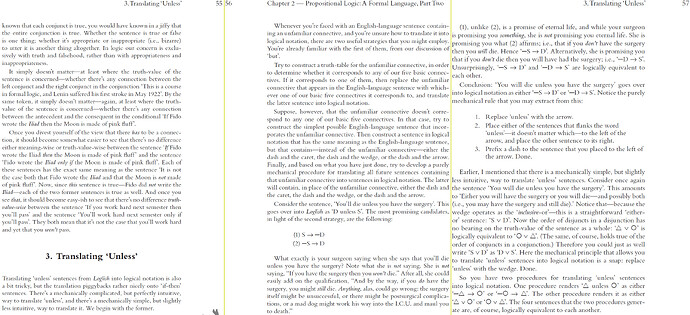I repost quotation from Lande in higher resolution ----
What type of class is this? If it’s a logic class, you probably can’t do better than teaching it as a term of art.
If you’re teaching English, trying to rationalize it is going to be tough, English is a Frankenstein’s monster of a language.
But I find that quote from etymonline to be clarifying, with an implied comparative that’s been dropped over time. And it makes some sense that “not on lesse” became “unless” as the “not” became implied, since “un-” keeps the sound of “on” and the negation of “not”. Not an entirely rational change, but has a certain logic to it.
It reminds of the french negative, “ne … pas”, which I understand to come from something like “not [even a] step”, i.e. not the least (conceptual) movement in the direction whatever’s being negated… A variant you sometimes see is “ne … point”, meaning something like “not [even a] dot/speck”, again with a sense of “not at all”.
Can you please post a clearer picture of the Lande text?
Perhaps an easier to read text could help:
The word “unless” can indeed be understood as having a similar meaning to “if not,” and its etymology sheds light on how this meaning developed.
The word “unless” originates from Middle English, where it was formed by combining “un-” (meaning “not”) with “less” (meaning “minus” or “without”). In Old English, “un-” was often used as a prefix to negate or reverse the meaning of a word, similar to its usage today.
The “-less” suffix in Old English denoted “without” or “lacking,” as seen in words like “careless” (without care) or “fearless” (without fear). Over time, “less” evolved to convey the idea of negation or absence more broadly.
So, when we combine “un-” and “-less” to form “unless,” we get a construction that essentially means “if not.” This is because “un-” negates the subsequent part (“-less”), resulting in a phrase that implies the absence of something, which is a condition similar to “if not.”
For example:
“I will go to the party unless it rains” means “I will go to the party if it does not rain.”
“You can leave now unless you have any further questions” means “You can leave now if you do not have any further questions.”
In essence, the etymology of “unless” supports its function as a conditional conjunction that expresses the idea of “if not.”
“Unless” means “less than” in the sense of “not at least” as in “If not at least x, then y”.
It seems to set a minimum in order to motivate/trigger some response.
In order to set a maximum in order to motivate/trigger some response, you would say “If at least x, then y”.
I’m not sure if that helps you with what you’re trying to do. It is probably important in maintaining homeostasis.
Like a negative feedback loop or something.
In French there is also au moins que, at the less that, and Spanish has a menos, to less, and they both are proper translations of unless.
Perhaps unless means that every case in which it is less than X, then Y.
If you do not eat, you starve. Unless you eat, you will starve. In a situation less than eating, you will starve. But with the negation of un, so we are already on the obverse side. Without less of your going, we will not go.
Probably the negation element is a vestigial portion attributable to the Frankensteinness. You are going to say that something is positive without the lack, but you are getting ahead of it with the un. Like saying I ain’t no fool. I ain’t fool would be more proper, but english is not that formal or structured and admits the impulse ase attributing significance. Doubling down in advance.

